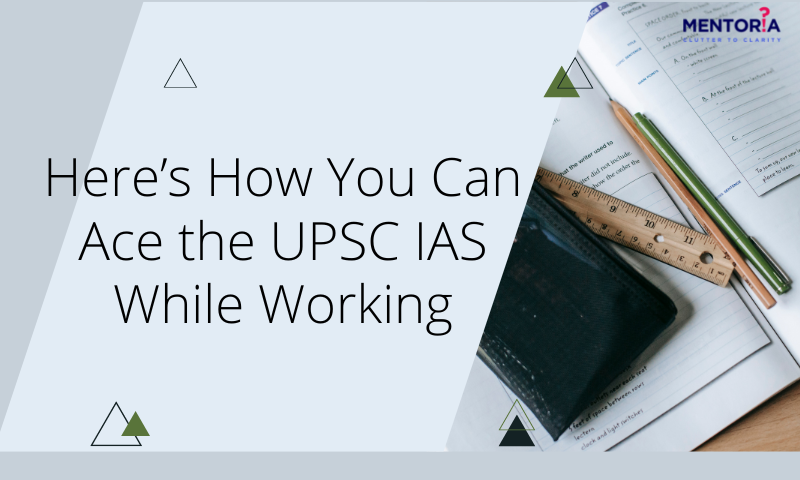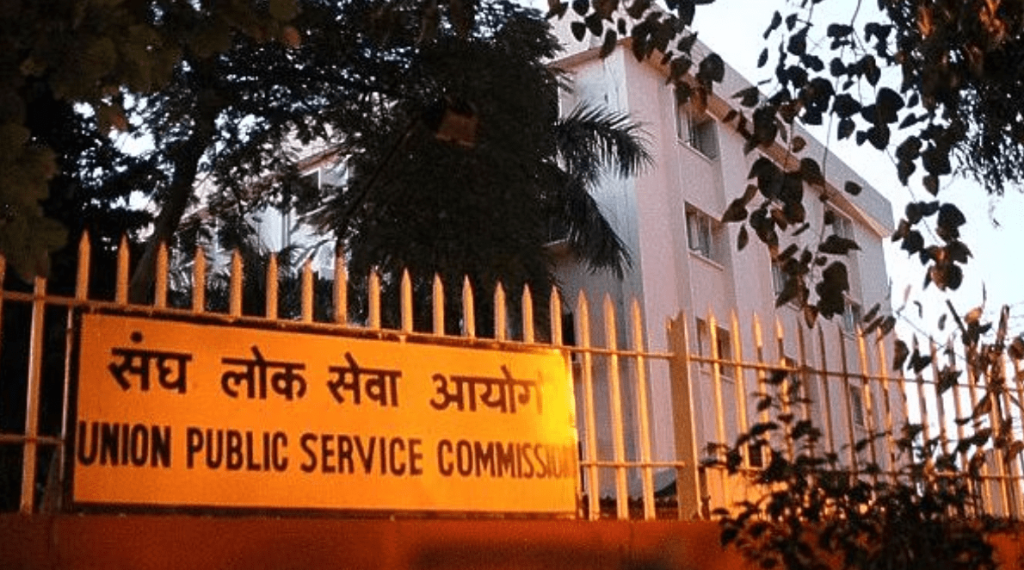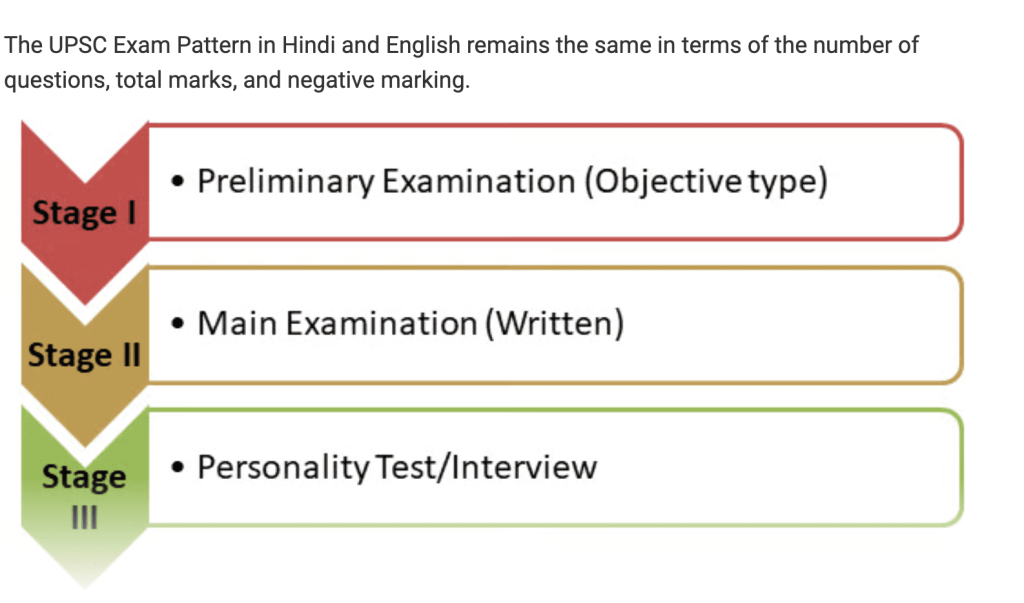Here’s How You Can Ace the UPSC IAS While Working

“Mera beta IAS banega!” is quite literally every Indian parent’s dream. However, if you’ve already stepped into another career and can’t seem to get started with your UPSC prep, we might just be your saving grace!
Let’s understand how the UPSC exams are conducted:
The Union Public Service Commission (UPSC) conducts its Civil Services Exam (CSE) every year to pick candidates for some of the most prestigious jobs in the Indian central government. The UPSC exam consists of three stages – Preliminary Exam, Main Exam, and Personal interview.
Now, the preliminary exam serves as a screening test for the main exam and the personal interview; its marks are not considered. A total of 24 services fall under this exam that serves the various branches of the government and one of these departments is the Indian Administrative Services (IAS).
If you’re wondering what an IAS officer does, dive in!
An IAS officer is one of the top bureaucratic positions in India and almost 5,00,000 candidates appeared for the UPSC exam in 2021, and guess what— that number goes up every year! An IAS officer supervises the administrative activities within the sector assigned to them. Roles in IAS include being a collector, magistrate, director, commissioner, and secretary, among others.
IAS is popular for three main reasons – salary, prestige, and perks. The basic salary package for an IAS officer is INR 6,70,000 per year, and it goes up with experience. Being an IAS officer commands a certain level of respect and admiration from society, partly because of your service to the nation and for possessing a level of commitment and discipline that most don’t. IAS officers are privy to several perks such as chauffeurs, residences, subsidised bills, trips, lifetime pension, and job security.
The UPSC exam is notoriously difficult to crack, with only a fraction of a percent of aspirants making it through every year. With this in mind, you as a working professional may not have the same amount of time to dedicate a bulk of your day towards studying, courtesy of your job. It can be especially challenging to maintain a work-study routine but it is not impossible. Far from it, in fact.
Let’s look at some strategies and tips that will help the ones with a job to crack UPSE in their pursuit of being an IAS officer.
- Make every second count!
As a full-time working professional, the bulk of your day is going to be invested in your job and commuting to and from your workplace. You can make this seemingly disadvantageous situation work in your favour. Due to your time constraints, you are always going to be aware and vigilant about your situation and remain extra dedicated to making the most of what you have.
Start your day off with at least two hours of study before heading to work. Make short notes of what you’ve studied or plan to study throughout the day and keep going through them. At work, utilise your lunch breaks to brush up on newspaper analysis and current affairs. Post-work, once again try to dedicate two hours to studying and 20 minutes of revision of everything you have studied throughout the day before you go to bed.
Weekends are like gold dust and you can get anything between 12-18 hours of studying done, depending on whether you work on Saturdays. This routine adds up to about 25-30 hours of study per week and over the course of one year, that is more than sufficient time for you to be able to confidently appear for the UPSC exam.
A scattergun approach is never effective and your time is too valuable for you to not be efficient. Trust the schedule you come up with and stick to it judiciously
- Have an integrated approach towards prelims and mains
Your prelims are not just a screening test for your mains. They can also serve as a confidence boost if you do well in them. It is advisable to approach both exams in an integrated manner from the start, with a focus on the mains, as there are very few topics that need to be done exclusively for the prelims.
The key is to not have too many study resources as it can get confusing and invite unnecessary pressure. Stick to one or two authentic sources and revise, revise, revise. For example, start with NCERT books for X, XI, and XII as these will serve as a solid base for both exams in the UPSC.
Create weekly and monthly goals and try to hit them as it will serve as a confidence booster. Use The Hindu or The Indian Express for newspaper analysis – it will cover parts of both the prelims and the mains.
- Always attempt mock tests!
Mock tests are going to be incredibly useful for firstly, giving you a gauge on where you stand initially and later on, to keep track of your progress. It makes you get used to the exam pressure and as you see the gradual increase in your scores, it builds your confidence. Mock tests also help build up speed.
Your concepts need to be absolutely clear heading into the prelims. This exam is a base for the mains and it’s paramount for you to have a strong one in order to do well in that particular exam. ICSE, NCERTS, and CCRT are good sources for you to get a hang of the basic concepts, theories, and in-depth knowledge that will give you an edge over others.
- Revise till you succeed!
Revision is the absolute key if you are going to do well in your exams as it helps build up retention. The last thing you should do before going to bed every night is to revise what you have studied throughout the day.
You can further streamline your process by identifying patterns as to which topics and questions have been repeated over the years. Remember, you have to work hard but also work smart. Every little bit adds up.
- Use the things in your favour to maximise your UPSC Mains score
There are around 120 days between your UPSC prelims and mains. This is the time for you to ramp up your efforts. The mains are a whole different ball game, partly because their marks are counted in your final tally. A straightforward way to do it is to maximise your output in the optional subject. It makes up almost a third of your total available marks and scoring well in it is a potential ace up your sleeve.
General Studies Paper 1 is another potentially advantageous subject for you as a lot of the content is common in both prelims and mains. As you may have already given your prelims by then, you can simply merge the topics and have a solid base to build on. Essay and General Studies Paper 4 can also serve as avenues to boost your marks. For both these papers, written practice is key and if you can do that judiciously, you stand to score well in them, thus hitting your goal of maximising your mains score.
Here’s a brief of overview of General Studies papers and their respective syllabus –
General Studies – I (Indian Heritage & Culture, History & Geography of the World & Society)
General Studies – II (Governance, Constitution, Polity, Social Justice & International Relations)
General Studies – III (Technology, Economic Development, Biodiversity, Security & Disaster Management)
General Studies – IV (Ethics, Integrity & Aptitude)
- Utilise your job as a source of motivation for UPSC
Your job may seem like a hindrance in your path to UPSC but you can flip that equation and see it in a positive light. Your employment ensures you have financial security and the resources to pay for your preparation. It also serves as a means to provide for yourself and your loved ones and that is undoubtedly a positive.
The job also acts as an environment where your mind is trained to work under constant pressure and that moulds you into becoming strong mentally and physically. Finally, the very fact that you have a job is a solid backup to UPSC and serves as a source of mental peace as opposed to someone who is solely dependent on clearing their exam.
- Enrol into personalised mentorship programmes
Getting yourself into any sort of dedicated coaching or mentorship program is always going to be a positive influence on your studies. Look for a personalised teacher or mentor who can adjust according to your work schedule.
These are experts that have attempted or cleared the UPSC exams and have years of experience in coaching people into clearing them. Their vast experience can make a difference when you are stuck and it allows these mentors to predict and mitigate any obstacles you may come across.
- Develop writing skills for the UPSC exam
Your score is going to be a reflection of how well you manage to enunciate and showcase your knowledge and preparation through your writing. Developing and optimising your writing skills is as important as studying for the UPSC. Not only is it going to help you frame your answers in an efficient manner but also help you complete your paper on time. Here are a few tips to work on your writing skills :
- Avoid using too much jargon.
- Focus on writing factual information that you can substantiate.
- Practice essay writing and writing, in general, regularly to iron out grammatical errors.
- Maintain a general answer structure of an introduction, main body and conclusion.
- The use of unnecessary, extra information can be detrimental. Stick to the mantra of ‘quality of quantity’.
After reading this article, do you, as a working professional, think you’re interested in trying out for UPSC? Is it something that attracts you? Or maybe you’re a student who is unsure about your future and what career to opt for? Well, we at Mentoria guide you on your journey towards achieving your goals by showing you the right path to choose from, based on your likes and interests. Get in touch with us now and help us help you!








